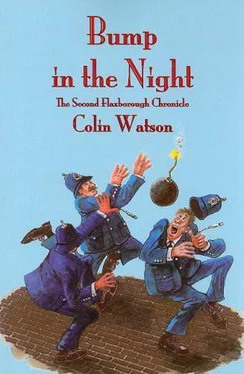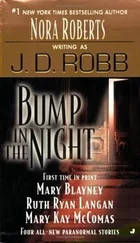“A dreadful fellow, they tell me.” Kebble said this in a tone almost of admiration.
“Ah...” Grope pondered. “He used to bring young women into the three and sixes. Marched them up the stairs like a drover. Mrs Parget said she never tore tickets for the same ones twice.”
“Did he, er...”
“There’s not a doubt of it. The usherettes got to be scared to use their torches. Think of that.”
Kebble thought of that.
“He’s not a patron any more,” Grope went on.
“Really?”
“No. It’s the television, I expect. Now there’s an immoral invention, if you like.”
The swing door thudded open and a lank-haired youth with nervous eyes and a red spike of a nose wheeled in a bicycle and propped it against the wall. “I’ve got a story, chief,” he announced, gangling up to Kebble.
“Don’t apply that loathsome expression to me, boy!” Kebble passed a hand through the daisy-white hair that sleeked straight back from his pink forehead and frowned like an abbot mistaken for a brothel keeper. “And next time you have occasion to ring me at the office please don’t say ‘Give me the desk.’ Muriel thought you were a firm of furniture removers. Now then, have you got those church services?”
The youth, who was called Leonard Leaper, looked unabashed. He struggled to extricate a large notebook from his jacket pocket and announced: “They’ve blown up the drinking fountain in the Jubilee Park.”
“What are you talking about? Who’s ‘they’?” Kebble gave a sidelong glance at Grope, a recognized authority on calamities, but drew no response.
“They? Well, somebody. The perpetrators.” Leaper looked pleased at this choice. “And every little bit of it’s gone. I’ve just been over to look. Some shrubs and things are down as well.” He thumbed hastily through his notebook. “I interviewed the park keeper. He’s married and has three children and he’s an old boy of the Alderson Road School. He served in the artillery during the first world war and is a prominent member of the Royal Anti...Anti...” Leaper paused and peered at his shorthand with disbelief.
“Anti-vivisection?” suggested Grope, hopefully.
Kebble leaned forward. “Never mind that, Leonard. What about the explosion, or whatever it was?”
The youth reluctantly disengaged himself from the puzzle of what the park keeper was a prominent member of and turned over a page. “The outrage,” he declared, “is thought to have taken place in the early hours of the morning. Mr Harding...”
“Harding?”
“Yes, the park keeper. Mr Harding said that while sleeping at his place of residence in East Street he was awakened by what sounded like a big gun going off. He thought no more of the incident until, on his arrival at the park just prior to taking up his duties at nine o’clock, he saw a jet of water rising from the ground in the spot hitherto occupied by the drinking fountain. Of this edifice, a well-known land mark in the town...”
“Hitherto,” Kebble interjected.
“...there was no trace.” Leaper snapped shut the notebook and bent down to conceal his flush of triumph in the business of removing his bicycle clips.
Kebble looked at Grope. “What a very extraordinary thing. Who would want to demolish a drinking fountain?”
“Brewers,” said Grope without hesitation. “They would do it. Any day of the week.”
Kebble turned to Leaper. “Have you been round to the police?” The youth shook his head and began putting his bicycle clips on again.
“No, never mind. I’ll give them a call myself.” The editor stood and reached down a broad brimmed hat. “They might know something about Biggadyke by now.” He nodded cheerfully to Grope, trotted round the counter and went out.
The police station was an integral part of the municipal buildings in Fen Street. This extravagant edifice, architecturally a compound of Baroque and Victorian wash-house, had two entrances. The main doors, leading to the rating, borough engineer’s and town clerk’s departments and to the council chamber on the upper floor, was reached by a flight of steps flanked by glazed tile walls in green, brown and ochre. On alternate steps were cemented cast iron pots from which sprouted cast iron plants, painted green and all very lifelike, save one that had been broken in the past and now bore on its main stem a gaspipe jacket secured by half-inch bolts.
At the side of the building was a less imposing entrance, a brown door permanently latched back in a small lobby from which an echoing white-tiled corridor led to the rooms and cells and dun-varnished court where Chalmsbury’s contingent of the county police scurried at the bidding of Chief Inspector Hector Larch.
It was into the not very sympathetic ear of Larch that Kebble imparted Leaper’s news of the destruction of the drinking fountain in Jubilee Park.
The chief inspector was an exceptionally tall man with a pasty angular face cradled within the rampart of his great lower jaw. While Kebble talked, he sat upright at his desk and gazed fixedly at an inkwell. He offered no interruptions but breathed through tightly set teeth, making a regular hissing noise that gave the impression of dutiful patience being gradually expelled by the pressure of annoyance within.
When Kebble had finished. Larch looked at him and relaxed his mouth so that the hissing stopped. A cold smile replaced his frown and he spoke softly.
“You think the boy was telling the truth, or had someone been pulling his leg?” A faint lisp went with the smile.
“Oh, he’s cretinous but not a liar,” Kebble said, loyally. “Anyway, it should be simple enough to verify. I thought maybe you’d heard something already.”
“Some sort of explosion was reported during the night from...” Larch turned over some papers on the desk. “... from Holmwood. Ozzy Pointer rang up about it, apparently. We’ve not had time to look into it yet.”
“Well, that’s the direction. Beyond East Street.”
“Yes,” said Larch placidly. He adjusted the already neatly arranged documents before him and added: “I suppose you want to make what you’d call a story out of it. A drinking fountain...” He smirked contemptuously. “You must be hard up. Come on, then, if that’s what you want.”
Quite suddenly, Kebble found himself following Larch out of his office and along the corridor to the rear yard. Larch climbed into his car, started the engine and drove with expert rapidity through the narrow archway into Fen Street before glancing stonily to see if Kebble had managed to scramble aboard.
When they arrived at the park Kebble again suffered the disadvantage of short legs as he tried to match Larch’s striding progress between the bowling greens to where a group of curious and mostly elderly citizens had gathered around a jet of water.
Larch pushed brusquely into the ring. The damage was even more impressive than Leaper’s account had suggested. Of the fountain’s column, bowl, and graven inscription to the memory of the late Lieutenant-Colonel William Courtney-Snell, J.P., there remained no identifiable fragment. The surrounding concrete, now awash, was cracked and deeply pitted. Some of the shrubs that once had formed a semi-circular screen were now leafless, as though stripped by an overnight winter; others had been blasted into stumps bearing a few tatters of bark.
One wooden wall of a small bowls pavilion about twenty yards away had been plucked out and thrown across the path. A row of bowls lockers behind it had collapsed, spilling their contents. These lay now among the debris like cannon balls in a stormed gun emplacement.
Kebble, who had removed his outsize hat not in awe but to facilitate his squeezing his head between the chief inspector and a particularly stubborn bystander, gave a soft whistle. “An outrage if ever I saw one,” he remarked appreciatively.
Читать дальше












